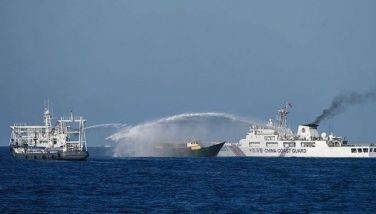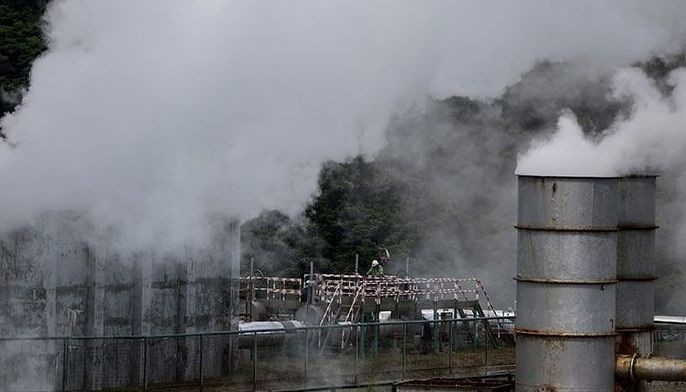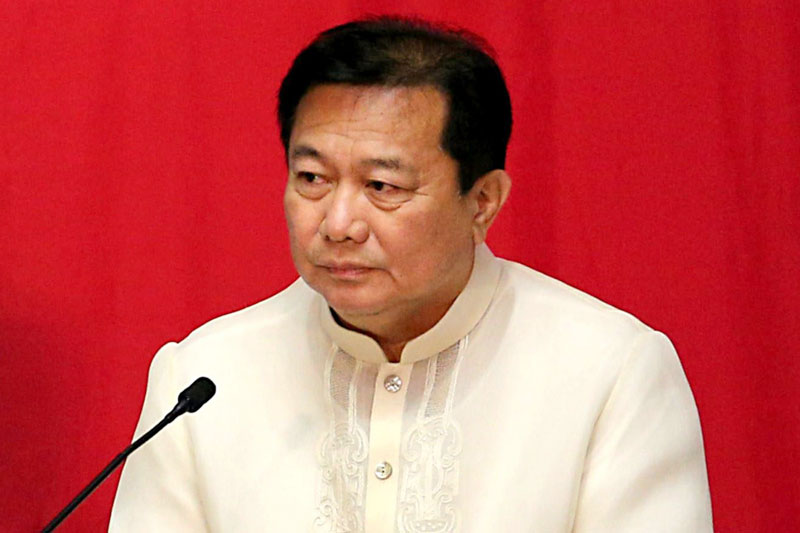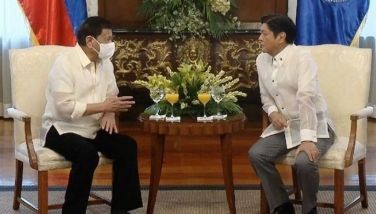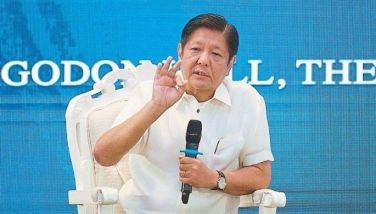Biden hails new era with ASEAN
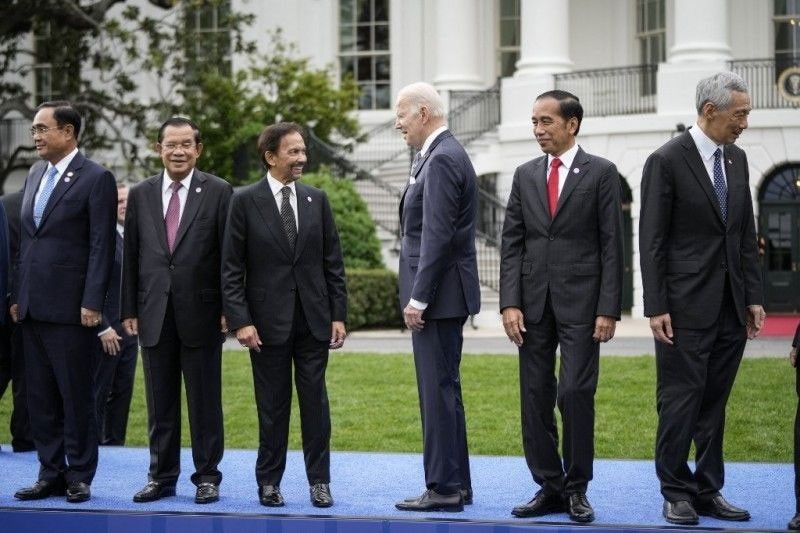
MANILA, Philippines — US President Joe Biden said on Friday a first summit in Washington with leaders from the Association of Southeast Asian Nations (ASEAN) marked the launch of a “new era” in the relationship between the United States and the 10-nation bloc.
In a joint 28-point vision statement after a two-day meeting, the two sides took what analysts called a symbolic step of committing to raise their relationship from a strategic partnership to a “comprehensive strategic partnership” in November.
On Ukraine, they reaffirmed “respect for sovereignty, political independence and territorial integrity,” wording that a regional expert said went further than past ASEAN statements.
The statement did not condemn Russia by name for its Feb. 24 invasion.
The summit marked the first time ASEAN leaders gathered as a group in Washington and their first meeting hosted by a US president since 2016.
Biden’s administration hopes the effort will show that the US remains focused on the Indo-Pacific and the long-term challenge of China, which it views as its main competitor, despite Russia’s invasion of Ukraine.
He was also hoping to persuade ASEAN countries to toughen their stance on Russia’s invasion of Ukraine.
Biden told the ASEAN leaders that “a great deal of history of our world in the next 50 years is going to be written in the ASEAN countries, and our relationship with you is the future, in the coming years and decades.”
Biden called the US-ASEAN partnership “critical” and said: “We’re launching a new era – a new era – in US-ASEAN relations.”
Vice President Kamala Harris said the US would remain in Southeast Asia “for generations” and stressed the need to maintain freedom of the seas, which the US says is challenged by China.
“The United States and ASEAN have shared a vision for this region, and together we will guard against threats to international rules and norms,” Harris said.
Neither she nor Biden mentioned China by name. The US has accused China of using coercion against its neighbors.
Harris said Washington would continue to respond with ASEAN to the threat of COVID-19, having already donated more than 115 million vaccine doses to the region.
She said both sides needed to show collective ambition on climate change, accelerate the transition to clean energy and meet infrastructure needs sustainably.
ASEAN groups Brunei, Cambodia, Indonesia, Laos, Malaysia, Myanmar, the Philippines, Singapore, Thailand and Vietnam.
Myanmar’s leader was excluded from the summit over a coup last year.
US treaty ally the Philippines, in transition after an election, was represented at the meeting by Foreign Affairs Secretary Teodoro Locsin Jr.
Biden hosted a summit dinner at the White House on Thursday, and his administration promised $150 million for areas including infrastructure, security, pandemic preparedness and clean energy.
China rivalry
New US commitments will include deployment of a Coast Guard vessel to the region to help counter what the United States and regional countries have described as China’s illegal fishing.
Still, US spending pales in comparison to that of China, which in November alone pledged $1.5 billion in development assistance for ASEAN over three years to fight COVID and fuel economic recovery.
Biden on Friday announced the nomination of Yohannes Abraham, chief of staff on his National Security Council, to be ambassador to ASEAN, filling a post vacant since the start of Donald Trump’s administration in 2017. Biden is working on other initiatives, including “Build Back Better World” infrastructure investment and an Indo-Pacific Economic Framework (IPEF).
Gregory Poling, a Southeast Asia expert at Washington’s Center for Strategic and International Studies think tank, said the summit was largely about symbolism with economics a missing component, as IPEF is not expected to be launched until Biden visits Japan later in May.
“Everyone seems happy and the diplomatic message of commitment is landing. But ... a modest, to put it kindly, $150 million isn’t going to impress anyone,” he said. “That leaves a lot riding on IPEF.”
Raising the relationship to a comprehensive strategic partnership matched similar moves by ASEAN with Australia and China last year.
“That’s symbolically important, though it wouldn’t change much in concrete terms,” Poling said.
He noted the statement on Ukraine did not condemn Russia by name, but said “the call to respect Ukraine’s sovereignty, political independence and territorial integrity is an obvious criticism of Russia and would seemingly commit all the ASEAN leaders to never recognize any Russian annexation on Ukraine.”
ASEAN countries share many US concerns about China’s assertiveness, including its claim of sovereignty over vast swaths of the South China Sea where several have rival claims.
However, they remain cautious about siding more firmly with Washington, given their predominant economic ties with China and limited US economic incentives.
Some, like Vietnam, Laos and Cambodia, have residual historical ties to Russia.
ASEAN states have been frustrated by a US delay in detailing plans for economic engagement since Trump quit a regional trade pact in 2017. Biden announced the intention to create IPEF at a virtual summit with ASEAN leaders in October.
Analysts and diplomats have said only two ASEAN countries – Singapore and the Philippines – are expected to be among the initial group to sign up for negotiations under IPEF, which does not currently offer the expanded market access Asian nations want, given Biden’s concern for American jobs.
In his intervention, Locsin batted for regional cooperation on various issues, including maritime security, during the special summit.
Among the issues discussed were mutual priorities in the region, including maritime security, pandemics, climate action, clean energy transformation, sustainable infrastructure.
The second day of the summit featured a working lunch hosted by Harris, followed by plenary sessions she and Biden chaired.
Locsin also highlighted the US role in keeping peace and stability in Southeast Asia.
“President Biden, your participation gives substance to the Biden-Harris administration’s commitment of being a strong, reliable and dependably present partner in the region, and of America as a force for good and stability in Asia and the rest of the world,” he said.
“That is why the Philippines fully supports the elevation of ASEAN-US relations to a Comprehensive Strategic Partnership,” Locsin added.
The secretary also welcomed the US Indo-Pacific Strategy, noting that it places Southeast Asia at the center of the regional security architecture.
“We look forward to the political launch of the Indo-Pacific Economic Framework. For that to work, inclusiveness in participation is essential,” he added.
Locsin also stressed the importance of transition to clean energy in response to the climate crisis.
“We are particularly interested in safe, clean and affordable nuclear power options such as small nuclear modular reactors, which are capable of being built and transported to far-flung energy starved areas,” he added.
“We have yet to develop domestic energy sources in safe, clean ways. But we need American assurance of being left in peace to find and develop our energy sources without threats from a bullying neighbor that sets conditions no sovereign country can submit to,” he added.
Locsin led the Philippine delegation, which also included ambassador to the US Jose Manuel Romualdez, Foreign Affairs Undersecretary Theresa Lazaro and Assistant Secretaries Daniel Espiritu and Angela Ponce.
Earlier this week, the US announced $60 million in new maritime initiatives in the Indo-Pacific region in time with the two-day summit.
Maritime initiatives
The White House, in a fact sheet released to the media on Friday, said the new regional maritime initiatives would be largely led by the US Coast Guard (USCG).
These include the deployment of assets and additional personnel to help meet requests of partners in Indo-Pacific for maritime training and capacity building.
The US Department of State, Department of Labor and USCG will also launch new initiatives to help ASEAN counties counter illegal, unreported and unregulated fishing and strengthen the capacity of ASEAN sectoral bodies to prevent forced labor in the fishing industry.
“The USCG will deploy a cutter to Southeast Asia and Oceania for security cooperation and to operate as a training platform. This cutter will deploy throughout the region providing multinational crewing opportunities, conduct training missions and participate in cooperative maritime engagements,” the White House said.
“As USCG decommissions cutters, the service will prioritize the transfer of ships to Southeast Asian countries to increase the coastal nations’ maritime law enforcement capacity and promote a free and open Pacific,” it added.
The US Department of State and USCG will expand support to maritime law enforcement agencies in Southeast Asia by placing a training team in the region, which will provide capacity-building for the regional partners’ maritime law enforcement agencies in the areas of institutional development, readiness, sustainment of equipment and workforce professionalization.
- Latest
- Trending
















